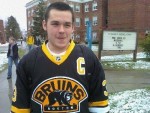Mushin’ around on break
Winter vacation had just started. No more classes, no more homework. While the rest of the world was sleeping soundly, Castleton freshman Dillon Gast was getting up at 5:30 a.m., while it was still dark out, to get on a sled and ride for 24 miles behind a pack of eight dogs.
Twice.
Gast spent a month and a half in Europe helping train and care for sled dogs so his mentor, Ullrich Kuhn, could race in the Pirena Advance, a two-week, 14-stage sled dog race in January. Last year, Gast lived in Germany and trained with the dogs for the same race, and they came in second overall.
“It really does teach them responsibility. This isn’t just winter sport. This is 365 days a year. You have to feed those dogs, train them, take care of them,” said Patricia Gast, Dillon’s mother.
This year Dillon only spent a month and a half in Europe, but it was an eventful month and a half.
The first two weeks of the training were spent in Norway.
“I was a dog handler. I had to train the dogs and get them into shape. Out of those two weeks I had two days off,” Dillon said.
He trained the dogs every morning. He went 13 miles an hour and went 24 miles per day with each of the two teams.
“I was the first one out there every morning. I even had to make a trail one day. I’d get off my sled, go clear a long path, go forward with the dogs, stop, get off, clear a path. I did that for six miles,” he said.
After the two weeks in Norway, they returned to Germany to let the dogs rest before going to Italy for some “fast training” — in the Alps.
“I’ve never been so scared running a team. These dogs were powerful,” Dillon said.
At one point, he and his mentor decided to race. Kuhn chose his team, and Dillon got whatever dogs were leftover. A race pace is usually 19 miles an hour, and that’s about how fast they went.
“And the thing with the Alps is, you’re riding on the side of cliffs,” Dillon said with a laugh.
Kuhn thought he’d chosen the faster dogs, but in the end Dillon’s team arrived a minute or two before Kuhn’s.
“My hands hurt because I wouldn’t let go of the bar,” Dillon said.
After training in Italy the team went back to Hamburg, Germany to repack supplies and head to Spain for the Pirena. That’s when things got a little bit tricky.
“We’re driving, we get a little past Paris, and the car breaks down. The engine blew,” Dillon said.
After many frantic phone calls and traveling through many European countries, they managed to get another car. They ended up missing the entire first day of the Pirena, resulting in a 58-minute penalty.
In the Perina you get a 30 minute penalty for an accident or something that’s out of your control, and the remainder of the penalty comes from the average time of the top three contestants at the time.
“I’ve lost races by a 100th of a second before … So 58 minutes is huge,” Dillon said.
The team went from dead last at the beginning of the two weeks to finishing in seventh overall.
“If you took away the penalty we would have come in second,” Dillon said.
Dillon has been racing for 12 years and aside from his many sled dog racing accomplishments, he has also made some major ground in skijoring – essentially being pulled on skis by a pack of dogs. His brother, Eddie, originally got into sled dog racing, so Dillon took up skijoring.
“When they were younger, we didn’t want them to compete against each other,” Patricia said.
The winter between ’08 and ’09, Dillon was the bronze medalist for skijoring in the world, and was the gold medalist in the United States. He was only 17 at the time.
“The kids were taught by really good mentors. The sport 10 years ago was huge. It’s dwindling now. My husband took them to a lot of races and they met a lot of people. We connected with the right people who had the patience to teach children. Children are the future of any sport, or anything,” Patricia said.
And part of the learning process dealt with sportsmanship.
One thing my dad taught us was that we needed to lose before we could win, so when we did win we knew how those people who lost felt, so we didn’t run around bragging,” Dillon said,
Next year will be Dillon’s last “official” year racing in both sledding and skijoring, but both he and his family think he’ll continue to enter into races for fun.
“He loves it so much. This is his adventure,” Patricia said.
Dillon echoed his mother’s comments.
“Sometimes I’m racing and I think: why am I doing this? I feel sick, I can’t go farther. And somehow deep down I push myself that much further. This is my chi…” he said with a grin.







